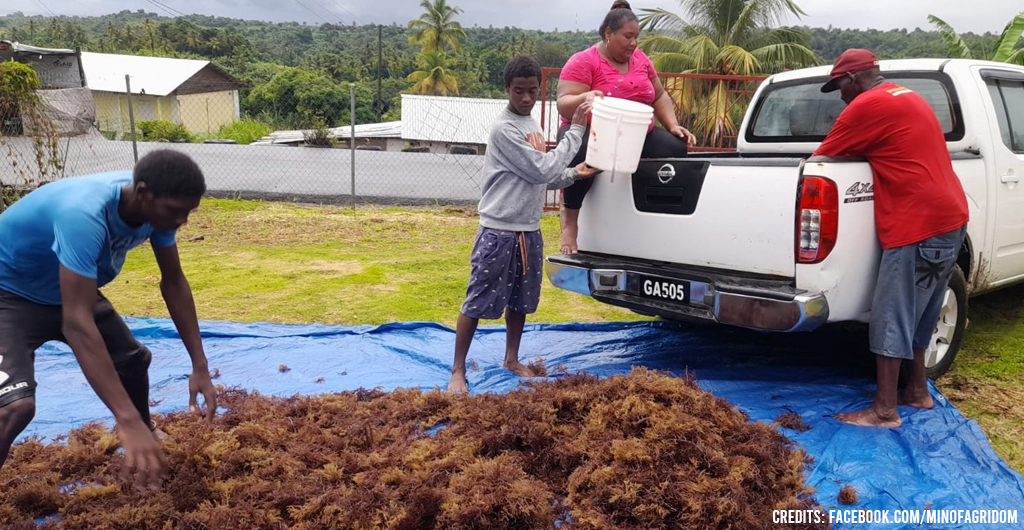FAO to fully support Dominica’s sea moss industry
In the Caribbean, sea moss, the algae more often known as Irish Moss, has long been a staple in handmade and commercially blended juices, with many claiming energy-boosting properties and various health advantages. The strand-like algae, a superfood widely sold in liquid and dried form, thrive in Dominican waters, although it is also imported from other Caribbean nations.
Using its indigenous type, the Commonwealth of Dominica has worked diligently in recent years to establish its sea moss industry. However, the Dominican species of Gracilaria grows slowly, posing a problem for farmers and producers.
The Food and Agriculture Organization of the United Nations (FAO) and the Ministry of the Blue and Green Economy, Agriculture and National Food Security of Dominica have collaborated to develop a sustainable and resilient sea moss industry in Dominica. This supports the promotion of sustainable and resilient value chains in the Caribbean and a Blue Transformation of aquatic food systems.
Providing a continuous supply of sea moss is the first step in this procedure.
On the Dominican market, sea moss beverages are very popular, and some are exported across the Caribbean. However, the Gracilaria sea moss is currently grown in the wild, has a very low yield, and requires more time to harvest than other types. This poses a severe supply difficulty for farmers of dried sea moss, which has substantial profit-generating potential.
Many producers, who acquire dried sea moss from farmers to make beverages, have been forced to rely on imported sea moss due to the country’s inability to produce the algae quickly and affordably and the prospect of its depletion.
Through conjunction with the Fisheries Division of the Ministry, FAO has recently introduced the production of Eucheuma, a variety of seaweed that is more profitable, rapidly growing, and sustainable. Currently, indigenous and imported Gracilaria and modest quantities of imported Eucheuma are employed to meet the demand for sea moss products. However, most local farmers are less familiar with Eucheuma cultivation.
FAO will promote the training of sea moss farmers in the sustainable cultivating, harvesting, and production of the Eucheuma type to support the introduction of this species as a viable alternative for growing in Dominica. Between January and March of 2023, the FAO regional expert on sea moss production will teach farmers appropriate agricultural practices for sea moss production and assist dedicated sea moss farms in becoming better positioned to assure a steady and high-quality supply of this rapidly-growing type.
Ms Bree Romuld of FAO’s Value Chain Development Programme said, “with a push towards recovery from the impacts of COVID-19, stronger income generating opportunities and environmentally and economically sustainable value chains in the Blue Economy, helping farmers to grow a consistent supply of sea moss and working our way up to developing the rest of Dominica’s sea moss value chain is a timely and pertinent step. If we can strengthen the sea moss value chain and build a thriving sea moss industry, we can help in improving livelihoods, increasing jobs and business opportunities for value-added products and encourage better management of aquatic resources.”
Improving Dominica’s sea moss value chain would also support efforts to reduce the Caribbean Community’s (CARICOM) food import bill by 25% by 2025 while maximizing the sector’s contribution to the country’s Gross Domestic Product (GDP) and contributing to the country’s attainment of the Sustainable Development Goals (SDGs). Most importantly, it will increase the revenues of sea moss farmers who are predominantly women. In addition, it will assist in improving production, the environment, and the quality of life for several Dominican families and communities, and it will ensure a more robust and sustainable sea moss value chain that supports social, environmental, and economic sustainability. This program is a component of the FAO Subregional Office for the Caribbean Value Chain Development Programme and is aimed primarily at the Sustainable Development of Resilient Value Chains and the implementation of the CARICOM COVID-19 Agri-Food Recovery Plan.



